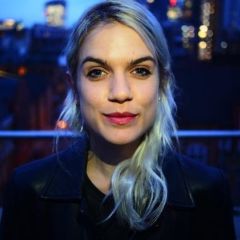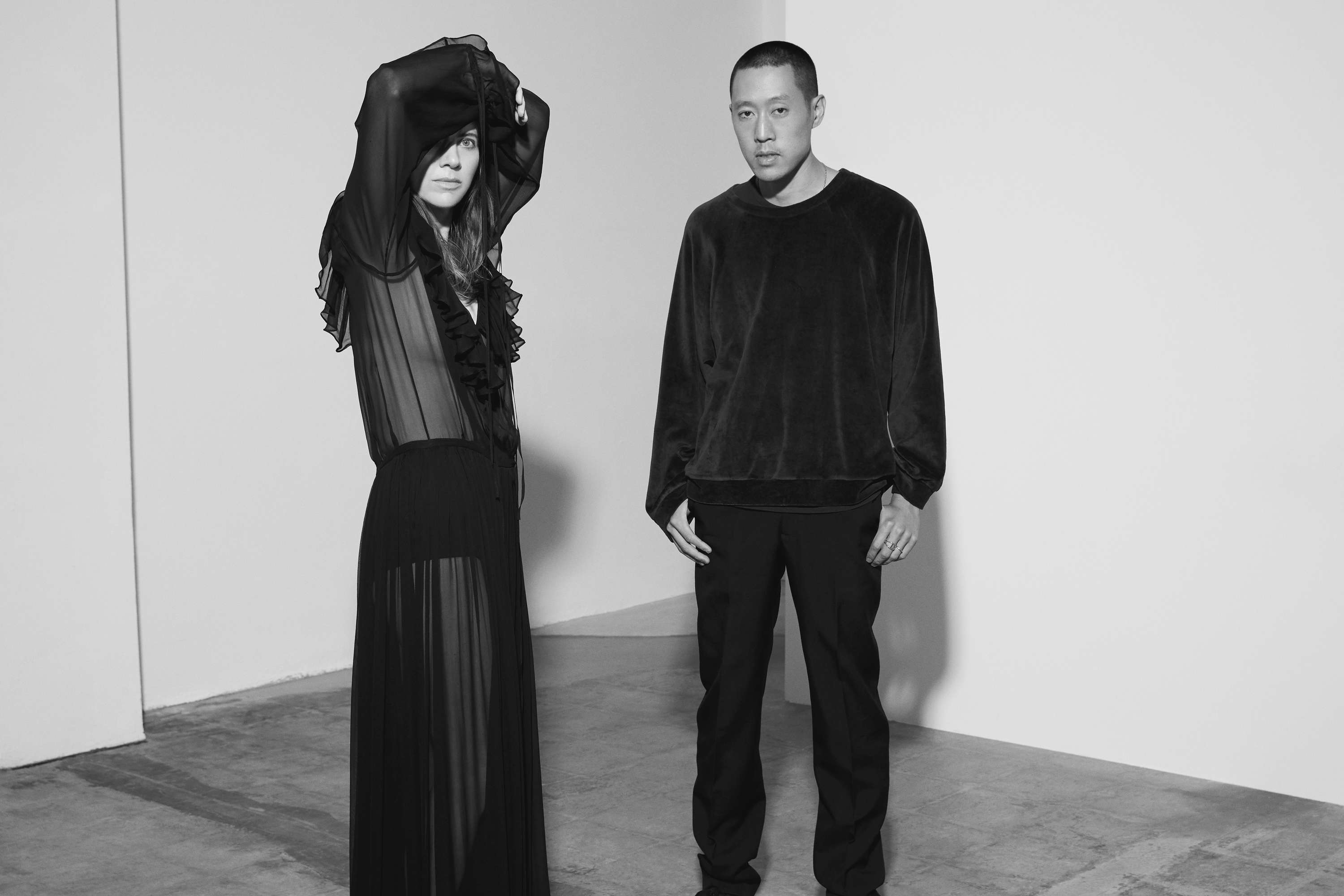Heavy beats warp in the dark on Mentions, the first music from HTRK in four years, and the sound is familiar. But then a scratch, a lingering guitar line, and it’s clear something has shifted. This one and More to Enjoy make up Drama, the two-track taster for a forthcoming album that nods to a new chapter in the Australian duo’s sonic evolution. Imperfections suspend in the reverb, between words reflecting on reality and the weight of experience. Leaving behind the flawless dreamscape of 2014’s Psychic 9–5 Club, they venture into the physical world.
Over a decade of collaboration as HTRK (pronounced Hate Rock) Jonnine Standish and Nigel Yang have been based in Melbourne, Sydney, Berlin and London – sometimes together, often not. That they’re now both living in the former has cued an exploration of acoustic and electronic duality, and a thing for unpolished sounds. But the sonic change is also about perspective: the new album will be the second they’ve created without former band member and friend Sean Stewart, who they lost in 2010, and time has allowed for a kind of presence.
These days they catch up to jam once a week. So on a recent Tuesday afternoon, they’re speaking from Jonnine’s house in the Dandenong Ranges, near Melbourne. They might be surrounded by miles of forest, but the energy of this next phase is real.
Tempe Nakiska: How does it feel to be in the same city again?
Jonnine Standish: It’s pretty great, we haven’t been living in the same city since 2011. Nigel’s been in Sydney and we saw each other as much as we could but it was pretty expensive, and I was flying up there a lot because it’s a pretty appealing place to visit when you live in Melbourne. But we haven’t been able to be as prolific as we’d like to be because of the distance, we really work better when we’re in the same room.
Nigel Yang: We also made a decision to be more live with our recording, we play and record at the same time and do a few takes then pick one – as opposed to a lot of music these days where everything is cut up to be perfect.
Jonnine: Yeah we decided to live with some of the little flaws, which is a new thing compared to Psychic 9-5 Club, where if there were any flaws we’d retake. When I’ve listened to Drama, I’m like, “Ah I feel quite vulnerable hearing that,” but I’m glad it’s in there.
Tempe: In terms of sound it’s such a pivot too, there’s this interplay between guitar and your voice Jonnine. There’s also a step away from the electronic feel of Psychic 9-5 Club, was that a conscious decision?
Nigel: It came about from reflecting on playing live, after touring Psychic 9-5 Club with synths and mixing desks I never thought I’d return to the guitar so much, but after that, whenever we did play a guitar song it felt way more interesting than electronic music, I wanted more life. When you’re playing guitar, the feedback – not noise feedback but sensory feedback – from the strings is just so different, with your flngers and your mind. It was just so much more enjoyable playing an instrument rather than interfacing with equipment.
Jonnine: With electronic music sometimes you lose the sense of the jam, because a lot of it can be worked out in post-production and parts can shift around. It’s wonderful now because the way we’re working is constructing songs on the fly, in person, and I feel like guitar and vocals are equally important, they’re both ‘vocals’, so they’re playing o each other and changing. We’ve also got a lot of changes and outros in our songs, which is different to the last album and is really refreshing when you’re writing. I’m having a lot of fun storytelling.
Tempe: I think the idea of ‘storytelling’ is quite apt, you can feel it in Drama. It sounds more tangible, more physical. Why did you pick the name?
Jonnine: Yeah it is very physical, I’m glad you said that actually, it’s theatrical and physical and slightly warmer. Drama is actually a humorous title, it’s because both of the tracks on it are a little more earnest than I’m comfortable with, and Nigel too probably. So Drama made the whole thing funnier. With the last album, mentally, I wasn’t in a very good place, I was pretty stressed out, pretty anxious and all those kind of things were going on, so that album was about trying to get to a good place – maybe unconvincingly sometimes. It was meant to be a beacon of light or a pathway. But years later, I actually feel like I really am in a good place, so it’s now a safe spot to actually delve into a lot of drama that’s happened, for us both. So I can really go there, because I know that when you’re delving into darker issues it can really fuck with you. While I’m in a good place, I want to go for it, you know? [laughs] But if we make another positive album you will know it all went to shit.
Nigel: All the death metal guys must just be beautiful people [all laugh].
Tempe: Yeah I see what you mean, and I think there’s more calm and peace in the music. Listening to both tracks I can’t help but feel like it’s slowing my thinking, if that makes sense?
Jonnine: Yeah maybe there’s more presence to them – that can really slow down your thinking as well. That’s how I feel about them personally: if you’re thinking about everything ‘dramatic’ in this kind of hell world, if you’re in that world, you’re just kind of burning, adding to it. But where we are at the moment, it’s like I’m sitting on a tightrope, reaching in to get subject matter from a safe space.
Tempe: I like that explanation.
Jonnine: [laughs] It’s probably terrible, but it kind of makes sense.
Tempe: I flnd that interesting, that you can come at these memories with more ease and clarity because you’re at this stage in life now.
Jonnine: Plus it’s also a way to process those experiences and put them to rest with songs. Especially when a story that you’ve experienced goes public, you need some resolve.
Tempe: Would you say the process of making and performing music is a kind of meditation?
Nigel: Yeah, it’s always about slowing down time and relaxing into some other wavelength.
Tempe: Has being in the forest – the visuals, and the climate – had an impact on the headspace you’re in when you’re making music? Especially since moving from humid Sydney, Nigel.
Jonnine: Nigel’s in the city and I’m in the forest, so we work between the two. The forest hasn’t made so much
of an impression so far but it’s meant that we can make more noise.
Nigel: But when I was in Sydney with Psychic 9-5 Club there deflnitely was this feeling of atmospheric pressure around you making you sweaty and putting you in this hazy mood. I liked intellectualising that a bit and reading people’s ideas on music that comes out of more tropical places.
Tempe: What’s the vibe in the music and creative scene in Melbourne?
Nigel: It feels like Melbourne is really happening. Recently when we did our single launch, instead of doing the typical three-bands-at-a-pub thing, we did a club night at The Night Cat and we just played for an hour in-between some proper DJ dance floor action. The fact that everyone had a really great time with that made me feel pretty great about being in the city too because it could have flopped, because a lot of people who go to see live music standing with their arms crossed might not think about this kind of vibe.
Jonnine: It felt really good to make it a proper gathering where everyone’s getting physical.
Nigel: The electronic music scene in Melbourne has grown so much, it felt like no-one was really DJ-ing and now it’s the norm. When I see new bands who are playing guitars, it seems so rebellious. But Melbourne’s cool because it’s always had this guitar thing, the number of people playing in Melbourne is pretty great, and how electronic music can exist at the same time. I love that the two worlds are blurring more and more.
Jonnine: Also, we all moved overseas in 2006 and since returning I’ve seen this dramatic rise in the women you see around, having all women in a band is no longer called a ‘girl band’ but just a band, women are at gigs and going out to see other women.
Nigel: There’s some great stuff going on in Melbourne musically, like this band CS + Kreme who shun any kind of publicity or commercial exposure but do great gigs and are making amazing music.
Jonnine: They only play outdoor gigs, and always announce them on Instagram, so everyone rolls up with 48 hours notice. They don’t have a press shot and if they’re standing together and I get my phone out they’ll separate.
Nigel: I asked them to play a show with us and they didn’t reply. [all laugh]
Nigel: After some years here you forget that over in places like London, the publicity machine is real – no matter how underground you think you sound you’ll get put into this machine where suddenly the clothes you’re wearing are of interest.
Jonnine: We had a really funny experience once where we were in the print version of NME with ‘Get the Look’. I was in a pair of football shorts and a blazer, not a good look.
Nigel: Yeah, like, “You can buy a jacket like this from H&M for 80 quid!” It’s so different over there; we’d get an invite from Nissan to take one of their new cars to our show and tweet about it.
Jonnine: Our manager at the time thought this was just normal.
Nigel: So it’s good be home [laughs].
Tempe: You both often have creative things ticking away on the side, and I heard something about you working on a soundtrack for a documentary?
Nigel: Yes, that’s finishing up soon, it’s a documentary about new religions and scientology.
Tempe: I’d love to hear a bit about this ghost train VR project you worked on for the Sydney Film Festival.
Jonnine: Nigel and I worked on the score for maybe two thirds of the ride and I asked Mike Vainio to do the intro of the ride, he did a fantastic piece. He also really loves ghost trains so that was really special. I’ve loved ghost trains since I was a kid, they were my favourite ride because I’m a bit of a ride baby, I couldn’t go on the Gravitron and all that stuff, it wasn’t for me. What I love about ghost trains in general is there’s this real weird, behind-the-scenes culture to them, but what I haven’t loved about them is how kitsch they were. So the idea was to take that ghost train format but to make a piece of art and make it really beautiful. It’s a ghost train from 1978 with the original carriages and track, and you really get jerked around the corners, while also having this virtual reality element. It was pretty thrilling. I worked with a filmmaker named Jasmin Tarasin, and two virtual reality artists, Joe and Patrick Hamilton. We also used this mapping technology to track the emotional state of people on the ride.
Tempe: You mentioned technology, and it made me think of the new track Mentions, where you talk about the impact of social media.
Jonnine: Yeah it’s about the vacuous nature of attention on social media, as compared to physical attention and sex. With social media I think it’s about balance – I’m a Libra so whenever I say balance it feels really throw away [laughs] – as I really enjoy social media but it’s also really lame so I make sure that I keep some distance. I think the secret to life is making sure you’ve got five really good, non-toxic people that find you funny, and you have great relationships with them, and then you can dip into social media and you’ll always feel grounded.
Tempe: One more thing, I’m really interested in people’s morning routines, do you have any you can share?
Jonnine: Oh, so are we, we’re always talking together about what we’ve added or dropped from our morning ritual. I’ve had periods where I’ve been really disciplined about it, but right now I’ve got the morning routine of a teenager.
Nigel: I do like a bulletproof coffee.
Jonnine: Oh yeah, I’m like if a teenager had bulletproof coffee! But where I can, my morning routine is kind of off the charts – it’s meditation, pilates, bulletproof decaf coffee with ghee, and then also trying to avoid decision fatigue, so my outfit’s chosen the night before.
Nigel: Yeah I love to meditate, exercise and have a cold shower. But I’ve got a two-year-old so right now it’s just making him honey butter toast.
Photography SULEYMAN KARAASIAN
Published in HEROINE MAGAZINE, ISSUE 10



